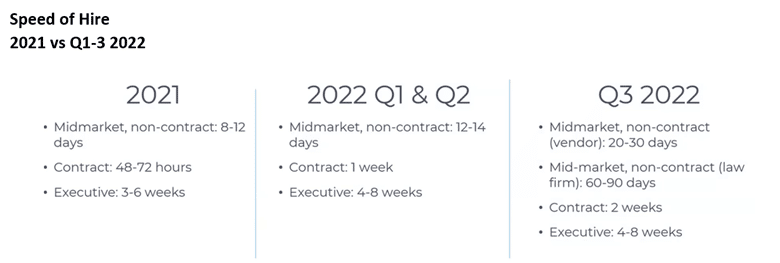As part of our monthly Eye on ESI webinar series, ACEDS President Mike Quartararo and VP of Strategy and Client Engagement Maribel Rivera and I met recently to discuss the current state of the e-discovery job market. Each month, we will bring you three key metrics, measured to show job seekers what the current speed of hire is, where compensation at the point of hire sits, and workforce evolution trends.
Speed of Hire Slowing for Law Firms
At TRU, we calculate the speed of hire from the first introduction of a job seeker to a client through to offer acceptance. This is the speed of hire chart for our October webinar. You’ll see that on the vendor side mid-market, noncontract professionals are still at about a 20–30-day complete cycle. However, the big news here is that law firms have far extended that timeframe for the exact same hiring positions by two or three times.

Why? The No. 1 reason is in-office mandates. Many TRU law firm customers are moving to a three-day in-office mandate. There are a couple of metrics I want to share with hiring managers that relate to this statistic – they are important to consider:
- There is a lack of willingness by job seekers in general to go into the office three days a week. Many more are inclined to go in two days or fewer.
- The difference in the volume of job seekers that a law firm will receive if they move from a three-day a week mandate to a two-day a week mandate in the office is nearly 50% higher. (If you see two candidates while holding onto a three-day a week mandate, you will see four or more with a two-day a week mandate.)
- If you have a one-day a week mandate, you’ll likely have far more job candidates to choose from.
Remember that these midmarket roles consist of PMs, data analysts, processing operators, etc. — which are 80% of the jobs in the business. This issue affects all of those roles and is what is taking law firms longer to find the best talent.
It used to be that vendors were in the same time cycle as the law firms in terms of how long it took to fill open roles. But because vendors have basically adopted a holistically fully remote culture for those who want it, and law firms are moving in the other direction, there is now a divide happening in the marketplace.
As a result of the pandemic, we’ve experienced a new way of working, and there has been a critical shift in US culture. Workers want more time with family and, as a result, flexibility matters more for people than it ever did before. In fact, flexibility matters more to us now than even career ambition.
Ediscovery Pros Examine Fine Points of New Roles Closely
Ediscovery mid-market professionals face a concrete ceiling in terms of vertical mobility. So, they tend to look at job descriptions and listen very closely to how hiring managers position expectations for open roles. These pros are looking for more money, more flexibility, and people who are appealing to work with. The need for these specific items is what drives people to change jobs. Therefore, many firms are finding it increasingly difficult to get people to come into an office. Workers’ priorities have shifted as job seekers.
Is ”In-Office” Really a Mandate for Everyone?
Hiring managers need to define the reasons for why coming into the office is important and then live up to those expectations. If you expect your mid-market new hires to have face time with stakeholders and attorneys, be sure those leaders and mentors are really making the effort to come into the office as well.
TRU talent agents are hearing this is not often the case. And the actuality is that the attorneys may not be coming into the office frequently, if at all. If ediscovery staff is being told to come in and have face time with attorneys, they may make the commute to come in only to find no one is there. That dissonance creates a lack of job satisfaction and that’s a major contributing factor to why people turn over even faster now.
Do all employees across the entire ecosystem need to have the same level of interaction with stakeholders and attorneys? That’s probably not the case. Project managers interact very differently with attorneys than data analysts or production pros do – the standards are different based on roles. That is creating dissonance as well. An in-office mandate needs a value proposition. That’s a shift in culture — it’s not like it was pre-pandemic, and we all must adapt.
People want flexibility. That doesn’t have to mean 100% remote, but it does mean entertaining the idea that employers need to compromise on certain variables in a job search to attract and retain talent.
The Ediscovery Hiring Market Is Still Strong
Even as the U.S. prepares to head into a recession, the ediscovery job market keeps moving forward. Unlike other recessions, unemployment is very low right now, lower than it was before the pandemic. That’s not how it usually goes. Usually when interest rates go up, the Consumer Price Index goes up, the stock market goes down and the unemployment rate goes up when people get laid off or fired to maintain corporate margins.
Right now, companies can’t afford to fire people. Ediscovery professionals are still getting 20% increases when they change jobs. Recently, I had a candidate get a 40% salary increase because three clients were fighting over that person. There is still a war for talent. Employers are not firing ediscovery pros. That might change, but until it does, the mid-market pros will reap the rewards:

The price point for PMs and coordinators with 4-7 years of experience has gone up significantly. The Sr. PM/Consultant level has also gone up. We’re seeing major law firms pay between $150 and $200K in base compensation for these folks with up to 7-10 years of experience. With more than 10 years, these folks are commanding salaries over $200K. While this is not happening everywhere, enough of TRU’s clients are paying these rates to make it a trend. This is not only being seen at the point of hire, but we are also seeing people get raises to keep them employed that are equivalent to these numbers.
Next month, Eye on ESI will feature end of 2022 Q3 trends and more – be sure to sign up to attend all monthly webinars here.

